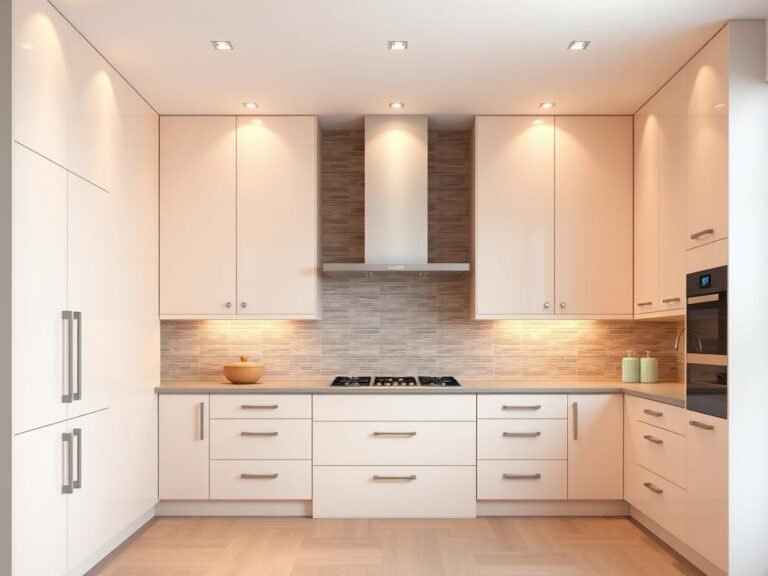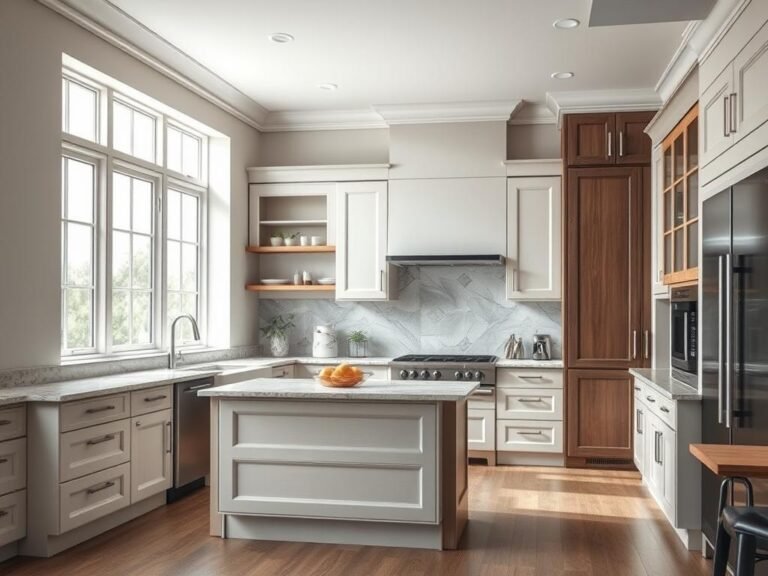Are you considering updating your kitchen but unsure about the expenses involved? Cabinet refacing offers a cost-effective way to transform your space without breaking the bank. But what exactly does it entail, and what should you expect to pay?
Industry experts reveal that the average price for this project typically ranges from $4,500 to over $13,000, depending on factors like material quality, labor, and kitchen size1. Whether you’re working with a small space or a large layout, understanding these variables can help you plan better.
Refacing is often a more affordable option compared to full cabinet replacement, saving you both time and money2. This process involves updating the exterior of your cabinets, giving them a fresh, modern look without the hassle of a complete overhaul. Plus, it’s a project that can be completed in just a few days, making it a convenient choice for busy homeowners.
By the end of this article, you’ll have a clear understanding of the costs involved, tips to negotiate quotes, and how to make the best decision for your kitchen. Let’s dive in and explore the details!
Key Takeaways
- Cabinet refacing costs range from $4,500 to over $13,000 on average1.
- It’s a cost-effective alternative to full cabinet replacement2.
- Factors like material quality and kitchen size influence the final price1.
- The process is quicker and less disruptive than a full remodel3.
- Planning ahead can help you stay within budget and achieve your desired results.
Introduction to Kitchen Cabinet Refacing
Transform your home’s look with a modern, budget-friendly upgrade. Cabinet refacing is a smart way to update your space without the hassle of a full remodel. This process involves replacing the cabinet doors and adding veneer to the exterior, giving your cabinets a fresh, stylish appearance.
Understanding this concept is crucial for homeowners planning a kitchen update. Unlike a full replacement, refacing keeps the existing cabinet boxes intact. This reduces both costs and time, making it an attractive option for many4.
Understanding the Concept
Cabinet refacing focuses on updating the visible parts of your cabinets. This includes replacing the doors, drawer fronts, and adding a new veneer to the frames. It’s a process that enhances the look of your space without the need for extensive construction.
By choosing this option, you can achieve a modern aesthetic while avoiding the high costs of a full remodel. It’s also a quicker project, often completed in just a few days5.
Benefits of Refacing Your Cabinets
There are several advantages to this approach. First, it’s a cost-effective way to refresh your space. On average, refacing costs 50-70% less than a full replacement4. Second, it’s less disruptive, allowing you to enjoy your updated kitchen sooner.
Additionally, refacing is an eco-friendly choice. It generates less waste compared to replacing cabinets entirely5. With the right material and design, your cabinets can look brand new and last for years to come.
By choosing the right refacing option, you can save both money and time while achieving the look you desire. It’s a practical solution for anyone looking to enhance their home’s functionality and style.
What Is Cabinet Refacing?
Looking to refresh your space without a full remodel? Cabinet refacing might be the answer. This process involves updating the visible parts of your cabinets, giving them a modern look without the need for extensive construction. It’s a practical and efficient way to enhance your home’s aesthetic.
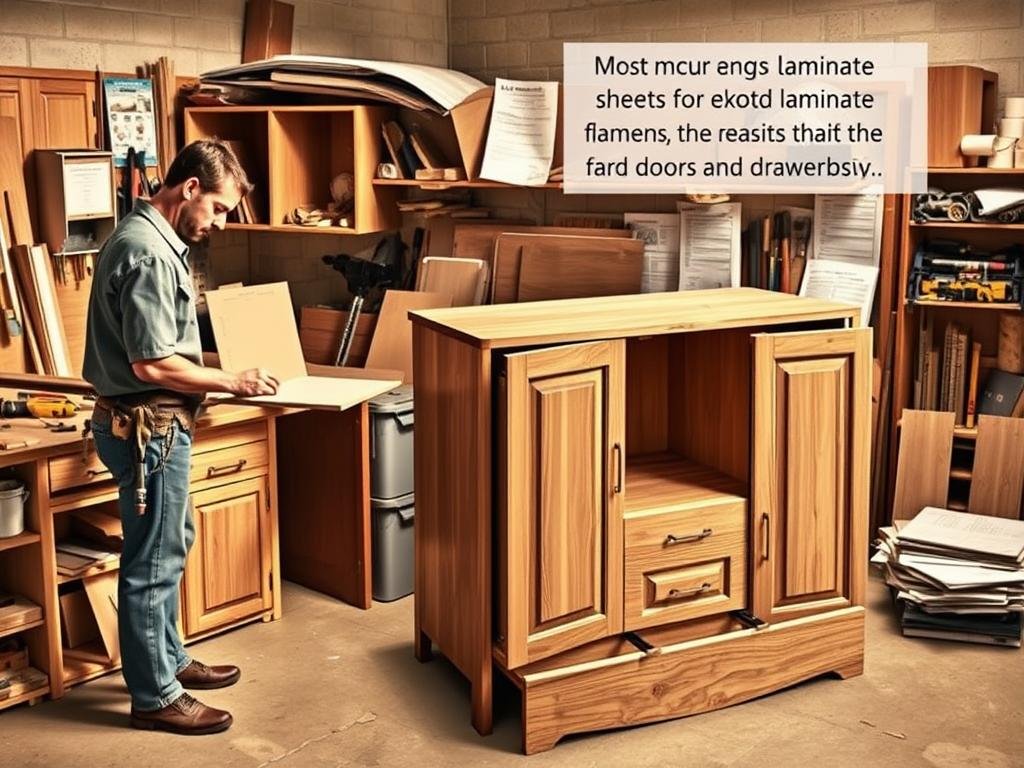
The Process Explained
Cabinet refacing begins with the removal of old doors and drawer fronts. These are replaced with new ones, often made from materials like wood or laminate. The existing cabinet boxes are then covered with a fresh veneer, creating a seamless, updated appearance6.
Professionals handle each step carefully to avoid issues like creases or bubbles in the veneer. This ensures a smooth, polished finish. The process typically takes three to five days, making it a quick and less disruptive option compared to full replacements7.
Here’s a breakdown of the steps involved:
- Preparation: The existing cabinets are cleaned and prepped for the new veneer.
- Removal: Old doors and drawer fronts are removed.
- Replacement: New doors and drawer fronts are installed.
- Veneer Application: A new veneer is applied to the cabinet boxes.
This method retains your kitchen’s layout while giving it a fresh, modern look. It’s also an eco-friendly choice, generating less waste than full replacements8.
By choosing cabinet refacing, you can achieve a stylish update without the hassle of a complete remodel. It’s a cost-effective and efficient solution for transforming your space.
how much does kitchen cabinet refacing cost
Planning a kitchen update? Understanding the expenses involved in cabinet refacing can help you make an informed decision. The average price for this project in 2024 ranges from $4,500 to $15,000, depending on factors like materials, labor, and kitchen size9.
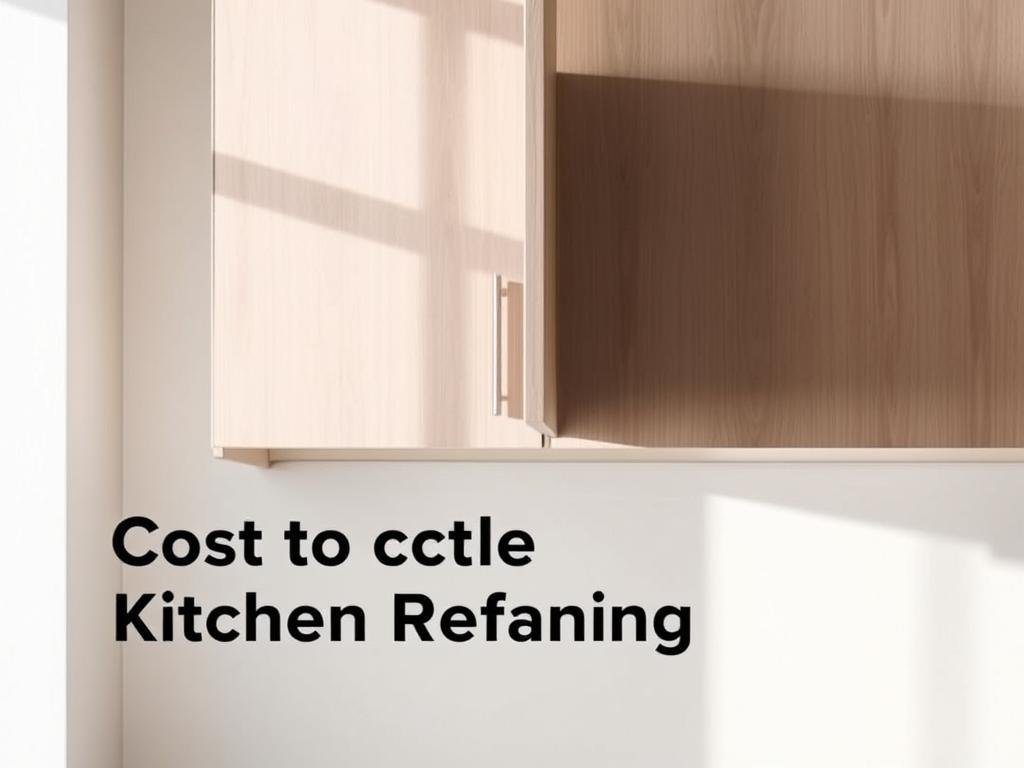
Average Price Range in 2024
For a standard project, you can expect to pay between $4,500 and $10,546, with the national average around $7,2209. Larger kitchens or premium materials can push the cost closer to $15,000. This makes refacing a cost-effective alternative to full replacements, which can exceed $30,00010.
Cost per Square Foot Overview
Refacing costs are often calculated per linear foot. On average, you’ll pay $210 to $750 per linear foot, compared to $400 to $3,500 for full replacements9. Here’s a breakdown of material costs:
| Material | Cost per Linear Foot |
|---|---|
| Laminate | $100 |
| High-Quality Veneer | $200 |
| Real-Wood Veneer | $455 |
Labor accounts for more than half of the total project cost, so location and complexity can significantly impact your budget10. For example, urban areas like New York City may charge higher rates compared to smaller cities like Boise, Idaho9.
Additional features like new hardware, crown molding, or upgraded storage solutions can add $750 to $4,000 to the final price11. By planning ahead and comparing quotes, you can achieve a stylish update without overspending.
Factors Influencing the Total Cost
When planning a home upgrade, understanding the factors that affect your budget is essential. Several elements can influence the final price of your project, from the materials you choose to the complexity of your space. By evaluating these aspects, you can make informed decisions and stay within your budget.

Material Quality and Options
The type of material you select plays a significant role in determining the overall cost. Veneer is often the most economical choice, while solid wood or high-quality finishes can increase expenses12. Laminate and thermofoil are budget-friendly alternatives, though thermofoil may peel under high heat12.
Premium materials like real wood veneer can cost between $2,500 and $9,000, depending on the project’s scope13. Balancing aesthetics with practicality ensures you get the best value for your investment.
Kitchen Size and Layout Complexity
The size of your space directly impacts the total cost. Larger kitchens require more materials and labor, which can drive up expenses12. Unique designs, such as intricate cabinet doors or glass-fronted cabinets, add complexity and cost12.
For example, refacing a 200 sq ft space with 30 linear feet of cabinetry can range from $1,000 to $9,00013. Evaluating your layout helps you anticipate potential costs and plan accordingly.
Location and Labor Considerations
Geographic location significantly affects labor rates. Urban areas like New York or Charleston often charge higher fees compared to smaller cities12. Labor costs can account for more than half of the total project expenses13.
Consulting local contractors for multiple quotes provides a clearer picture of budget ranges specific to your area12. This ensures you get fair pricing and quality workmanship.
By understanding these factors, you can make smarter choices and achieve a stylish update without overspending. Planning ahead and comparing options empowers you to create a space that meets both your aesthetic and financial goals.
Comparing Refacing, Replacing, and Refinishing Cabinets
Choosing the right approach to update your cabinets can make a big difference in your home’s appearance and budget. Refacing, replacing, and refinishing are three popular options, each with its own process, cost, and benefits. Understanding these differences will help you decide which option suits your needs best.
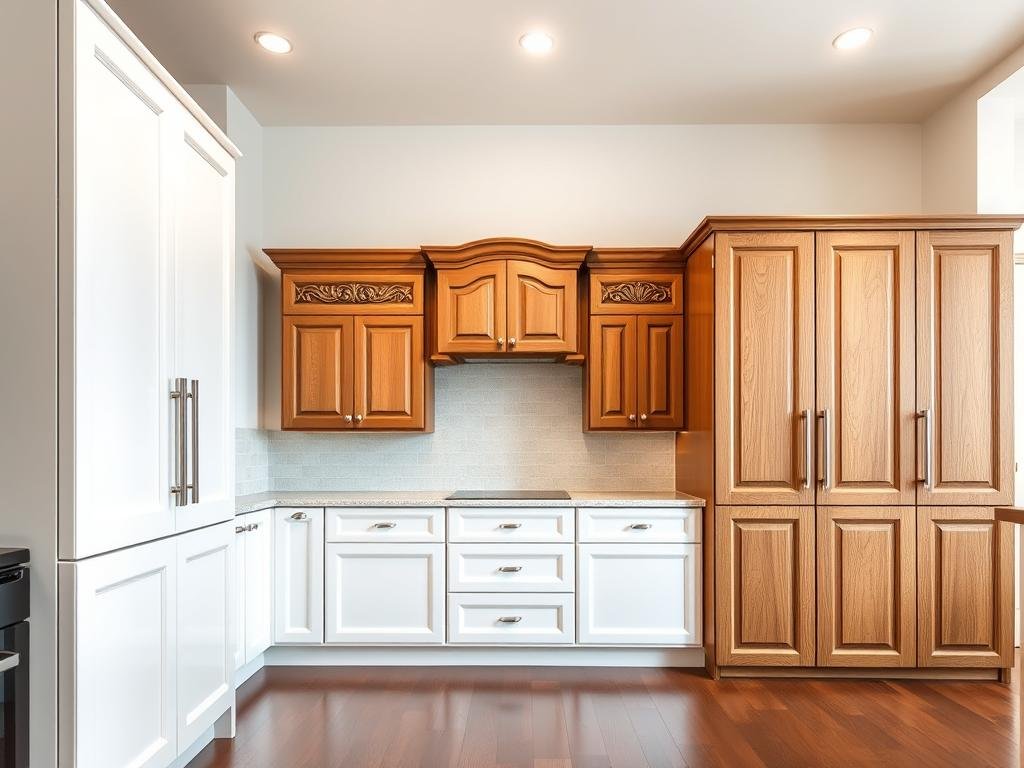
Key Differences in Process and Cost
Refacing involves updating the exterior of your cabinets by replacing doors and drawer fronts and applying a new veneer. This process is quicker, taking 3 to 5 days, and costs 30-50% less than a full replacement14. It’s ideal for cabinets in good structural condition.
Replacing cabinet involves removing the old cabinets and installing new ones. This project is more extensive, taking 5 to 14 days, and costs between $6,000 and $21,00014. It’s best for outdated or damaged cabinets.
Refinishing focuses on restoring the existing cabinets by sanding, staining, or painting. It’s the most affordable option, costing $1,500 to $5,000, but may not last as long as refacing or replacement14.
Pros and Cons of Each Option
Here’s a quick comparison to help you weigh your choices:
| Option | Pros | Cons |
|---|---|---|
| Refacing | Cost-effective, quick, eco-friendly | Limited to cabinets in good condition |
| Replacing | Completely new look, customizable | Higher cost, longer timeline |
| Refinishing | Most affordable, preserves original cabinets | Less durable, limited design changes |
Refacing offers a high return on investment, estimated at 65% to 80%, and can extend the life of your cabinets by up to 30 years14. For those seeking custom solutions, replacing allows for complete personalization, though it comes at a higher price.
Ultimately, the right choice depends on your cabinet condition, design goals, and budget. By comparing these options, you can confidently select the best approach for your home.
Material Choices and Their Impact on Price
Selecting the right material for your cabinet update can transform both the look and longevity of your space. From budget-friendly laminates to premium wood veneers, each option offers unique benefits and challenges. Understanding these differences helps you make a choice that aligns with your style and budget.
Low-End vs. Premium Materials
Budget-conscious homeowners often opt for laminates or thermofoil, which cost between $80 and $120 per linear foot15. These materials are affordable but may chip or peel over time. On the other hand, wood veneer, priced at $100 to $250 per linear foot, offers a balance of durability and elegance15.
For a high-end look, solid wood is the top choice, costing $200 to $500 per linear foot15. While it’s more expensive, it provides unmatched durability and a timeless appeal. Choosing the right material ensures your cabinets look great and last for years.
Durability and Maintenance Factors
Material selection directly impacts maintenance requirements. Laminates are easy to clean but prone to damage, while wood veneer requires occasional polishing to maintain its finish16. Solid wood is the most durable but may need refinishing over time.
Here’s a quick comparison of popular materials:
- Laminate: Affordable, low maintenance, but less durable.
- Wood Veneer: Mid-range cost, durable, and stylish.
- Solid Wood: Premium price, long-lasting, and elegant.
Investing in higher-quality materials can enhance the overall look of your space while reducing long-term maintenance costs17. By balancing appearance and budget, you can achieve a stunning update that meets your needs.
Tips to Save Money on Your Cabinet Refacing Project
Want to give your space a fresh look without overspending? Cabinet refacing is a smart way to achieve this, but there are even more ways to keep costs low. With careful planning and smart choices, you can stay within your budget while still getting the results you want.

How to Compare Quotes and Negotiate
Start by gathering quotes from at least three professionals. This helps you understand the average cost for your project. Look for detailed breakdowns of labor, materials, and additional fees. Don’t hesitate to negotiate for better pricing or ask for discounts on bulk materials18.
Many contractors offer warranties or guarantees. Use this as a bargaining chip to secure better terms. For example, a longer warranty can save you money on future repairs19.
Smart Choices for Hardware and Accessories
Upgrading your door drawer handles and hinges doesn’t have to break the bank. Opt for refurbished or clearance items, which often cost 30-50% less than new ones18. Simple, classic designs are not only affordable but also timeless.
Here’s a quick comparison of hardware options:
| Option | Cost | Benefits |
|---|---|---|
| Refurbished Handles | $5-$15 each | Affordable, eco-friendly |
| Clearance Items | $10-$20 each | Discounted, stylish |
| Custom Designs | $25-$50 each | Unique, premium look |
For minor tasks like painting or installing hardware, consider a DIY approach. This can save you hundreds of dollars in labor costs19. However, for complex tasks like veneer application, hiring a professional ensures quality and avoids costly mistakes.
Finally, plan your remodel carefully. Set a clear budget and stick to it. Prioritize essential upgrades and consider phased investments for long-term savings. With these tips, you can achieve a stunning update without overspending.
Deciding If Cabinet Refacing Is Right for You
Thinking about giving your space a fresh look? Cabinet refacing could be the solution you’re looking for. This process offers a cost-effective way to update your kitchen without the hassle of a full remodel. But before diving in, it’s essential to evaluate whether your existing cabinets are suitable for this approach.
Assessing the Condition of Your Existing Cabinets
Start by examining the structural integrity of your cabinets. If they’re in good shape but just look outdated, refacing is a smart choice. However, sagging frames, water damage, or severe wear may indicate the need for a full replacement20.
Here are some key criteria to consider:
- Sturdiness: Are the frames and boxes still solid?
- Design: Is the layout functional, or do you need a complete overhaul?
- Cost: Refacing is 30-50% cheaper than replacement, making it ideal for budget-conscious homeowners21.
If your cabinets meet these criteria, refacing can extend their life by up to 30 years20. It’s also a sustainable option, reducing waste compared to full replacements22.
When to Hire a Professional vs. DIY
While DIY projects can save money, refacing is a job that often requires professional expertise. A skilled contractor ensures a polished finish and avoids common pitfalls like uneven veneer or misaligned doors20.
Here’s a quick comparison to help you decide:
| Option | Pros | Cons |
|---|---|---|
| Professional | High-quality results, faster completion (3-5 days) | Higher upfront cost |
| DIY | Cost-effective, personal satisfaction | Risk of errors, longer time commitment |
For custom designs or complex layouts, hiring a professional is often the better choice. They can handle intricate details and ensure your kitchen looks its best22.
By carefully evaluating your cabinets and weighing the pros and cons of each approach, you can make an informed decision that suits your needs and budget.
Conclusion
Ready to transform your space without a complete overhaul? Cabinet refacing offers a practical and cost-effective option to modernize your home. By understanding the cost factors, material choices, and process timelines, you can make an informed decision that aligns with your style and budget23.
This project not only enhances the appearance of your space but also provides a high return on investment, often ranging from 70-80%24. Whether you’re looking for a quick update or a long-term solution, refacing is a smart way to achieve your goals without overspending.
Take the next step by comparing quotes and consulting professionals. With careful planning, you can create a stunning transformation that adds value to your home. Your dream space is just a decision away!



